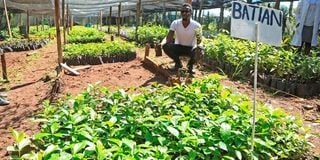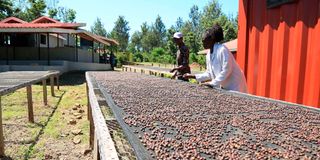Premium
Edwin Abonyo, the Kisumu farmer who smelled coffee and ditched sugarcane farming

Koru Farm Director Ted Abonyo shows some of the coffee seedlings at Fort Farm’s nursery in Muhoroni in Kisumu.
The drive from Kisumu to Koru takes about an hour and 30 minutes. We are on our way to Fort Farm, which is involved in coffee farming and other related activities.
The area is relatively hot, and is dominated by vast coffee and sugarcane plantations. When we get to the farm, we find Martha Achieng, the farm’s manager, and other workers picking coffee berries at a hill known as Kipchui. The harvesting season is expected to go up to the month of November.
At this particular spot, about 15 acres of land is planted with Batian and Ruiru 11 coffee varieties.
“We have been producing coffee for six years now. Currently, we have a 30-acre estate with 27,000 coffee bushes,” says Achieng.
Other coffee varieties grown on the farm are K7 and SL28 - just a week ago, they planted another 3,400 SL28 varieties.

Farm Manager, Martha Achieng (left) picks berries with other workers.
“We are trying to replace the bushes that are affected by diseases. Ideally, each acre should have 1,000 bushes to maximise on the cost of production,” explains Achieng.
The owner of the farm, Edwin Abonyo, explains that he ventured into coffee production after years of disappointment in the sugar industry.
“Before venturing into coffee production, I was cultivating sugarcane, but the returns were low, I had to look for an alternative crop, and therefore settled on coffee,” says Abonyo, clarifying that he reached this decision after doing lots of research on the viability of coffee.
Abonyo started with 1,000 bushes of SL28 and K7 on one acre back in 2017, and with time, he introduced Batian and Ruiru 11 varieties.
Abonyo, whose background is in agriculture, also produces coffee seedlings. The coffee crop is propagated by either seeds or cuttings. Selection of quality seeds is very important in coffee growing. The husk is first removed from the selected seeds, after which the seeds are rubbed in ash to prevent sticking.
It is recommended to sow these seeds 2.5cm apart. It takes 40 days for germination after sowing in the field.
These coffee seedlings are then uprooted and transplanted in polythene bags at a spacing of 25cm.The farm sells each seedling for Sh40 per piece.
Whereas SL28 is able to attain 100kg at optimum yield, Ruiru 11 manages just 30kg.
“After establishing the right variety, I begin by digging holes measuring 3by 2feat and observing spacing of 9by9feat. I then place dry leaves on the bottom of the hole to a layer of about six inches. This ensures the base is soft enough for the coffee roots to penetrate,” he explains.
Afterward, the farmer adds topsoil until only six inches of the hole is uncovered. He then adds manure mixed with topsoil up to the top of the hole and then waits until it rains and plants his seedlings.

Fort Farm Manager Martha Achieng’, and Gideon Too, who is in charge of the farm’s nursery, air out dry coffee berries outside the pulping station.
In June 2022, he set up a pulping station to process his coffee for the market.
“Compared to sugarcane farming, coffee has higher returns. On daily basis, I process 30,000kg of coffee berries,” he says.
Once the harvested coffee berries are sorted at the pulping station, the berries that are under ripe, over ripe, over size or damaged by diseases are separated and categorised as Mbuni, low grade coffee.
As for the quality berries, they are weighed and driven through a pulping machine.
During the pulping process, a lot of water is needed to accelerate removal of the red coat, resulting in B1, B2 and B3 coffee parchments. The pulping machine removes the husks and sorts the beans into different grades.
“The beans are channeled into different tanks. They are left to ferment for the next 24 hours before they are dried on racks to achieve a moisture content of 14 percent,” explains Achieng.
The beans will be fully dry between seven to 14 days, after which they are stored. At the mill, the coffee husks are removed and categorised into AA, AB, C, PB, MH, ML and UG.
“We pack them in sisal sacks in various grades. When they are dry, we call them parchments,” she explains.
Currently the farm sells its coffee through auction, and is in the process of exporting its coffee to Canada.
Challenges
Despite the thriving coffee business, it has its share of challenges.
Abonyo points out that there’s little support from both the national and county governments towards farmers.
“In Kisumu County, there are a number of farmers, but we hardly get any support from the government. We are on our own,” he stresses.
Besides this, farmers also have to put up with a multitude of middlemen who make money at the expense of the farmer’s toil. Another challenge is the fact that the coffee sector has many regulators.
In five years’ time, Abonyo plans to further expand his coffee plantation, establish a warehouse in Nairobi, as well as maximise on coffee value addition.





